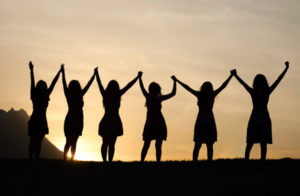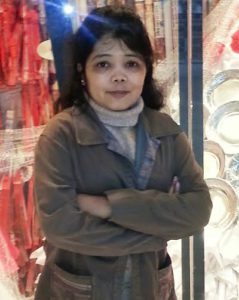
“Feminism isn’t about making women strong. Women are already strong. It’s about changing the way the world perceives that strength,” said G.D. Anderson. Sadly, for many people feminism has come to mean being anti-men and feminists are considered men-haters. But people raising a cry for women empowerment and safety are not raising a cry against men. We are just raising a cry against the injustice and inequality that half the population of the world has been suffering since ages.
Feminism, Women Empowerment and Women Safety are about ensuring dignity, health and happiness of women and to assert their equality and human rights.
In many cultures, gender equality and women’s rights don’t seem to matter at all. In countries like India, this discrimination is much worse. Earlier, Indian women suffered abuse in the name of culture. Now we are being abused in the name of loss of culture. And if we raise a cry for our empowerment and safety, accusing fingers find it very easy to lay the blame of all our suffering on our heads.
Very recently, one of my tweets got me a very shocking response from some ‘men-liberation’ groups. ‘’You women just want to put all Indian men behind bars in fake cases,’’ one person tweeted to me. Is that what we want? To punish all men and make them suffer? No. Then what is it that we want? What are we hoping to achieve by raising a cry for women empowerment?
Before I answer that, let me briefly narrate a tale.
Once, to save the life of King Arthur, his knight Lancelot had to fulfil a difficult condition. He had to find the answer to the question “What do women want?” Even Sir Lancelot, the brave and wise knight of legendary king Arthur couldn’t figure out the answer to this. So, having no other option, he agreed to marry a scary, old and hideous witch in return of the answer.
“It is simple,” the witch told him, “women just want to be the master of their own life.” In other words, women want the liberty to choose and the power to follow their own choices.
Lancelot had the answer that he needed and paid the price of it by accepting a bride whose mere sight was enough to freeze a person with terror. But Lancelot was a man of his words and he married the old witch. The witch was pleased with his polite and respectful behaviour towards her. So she rewarded him with this promise. “I’ll appear as a young and pretty women for half the time. You can choose whether you want me to appear pretty during the day or the night.” That choice might perhaps have baffled anybody. But Lancelot had learnt his lesson. He smiled and said, “It’s your life. Only you have the right to choose how you want to live it.” The witch was pleased. Lancelot had passed her test. And as a reward, the witch gave up her evil and terrifying appearance forever.
It might be just a fable or a myth. Probably without a grain of truth in it, other than the witch’s answer. What do women want? Only to be the master of our own life and to be able to make our own choices.
And that is what women empowerment means to me. Power to every women to live her life as she wants to live it. To have the freedom to make her own choices and power to follow these choices without any fear, hesitation or restriction.
People think that women are denied that freedom only in backward rural regions. But that is not true. Even in urban areas and in educated families, girls and women are told at every step what they should or should not do. Wear this, don’t wear this. Go there, don’t go there. Talk like this. Don’t talk like this. Do this, learn this. Don’t fall in love. Don’t disobey your husband. Even if a girl has studied hard to establish a good career, she’s supposed to give it all up if her in-laws or husband don’t like her working. And if the girls don’t follow the established rules, they are indecent, immoral, selfish and so on.
Many girls are denied even that basic right of education. And lack of education shackles them forever to the dependence upon their family and male relatives. And thus, she can easily be treated as inferior and not deserving of the respect and dignity that men readily consider as their prerogative.
And that’s what we have to fight against. This denial of basic human rights to women. Whether it is the right to education, the right to choose our own career, the right to strive for our betterment, respect and dignity. It is our life, and to live it as we choose is our right! To help every girl and women realize this right is the aim of all women-empowerment activities.
And the greatest tool of women-empowerment is Education. Education of girls and women so they become better aware of their rights and can make better choices. Education to help them establish a career and become financially independent. Education to help them know how they can protect themselves and protest against abuse. Education to help them rise above social stigmas and dogmas. Education to help them realize when they are being wronged and to protest against it.
When Malala Yousafzai risked her life fighting for the right of education of girls in her country, it was because she knew that education was much more than cramming up a few lessons and passing a few school exams. Education is the road to awareness of bonds and the power to free ourselves from those bonds. And that is why she said, “I raise up my voice—not so I can shout, but so that those without a voice can be heard…we cannot succeed when half of us are held back.”
These days, our honourable Prime Minister Shree Narendra Modi ji is laying great stress on skill development. Skill development too can prove to be a useful tool for women empowerment. I believe that skill development can be just as important for women as it is for men. Perhaps even more important. Skill development can prove to be very useful in giving financial independence to those women who prefer to stay at home and look after their families. It can help even them build a career. It can open up many new opportunities of work for girls and women, thus empowering them towards a better future.
But all this knowledge and skills development will remain meaningless unless we succeed in bringing about a change in the attitude of the society that has since ages considered women as inferior to men, and yet far more responsible for upholding all the real or perceived moral virtues and cultural values. It is this attitude that gives rise to the tendency of victim-blaming in cases where a woman gets abused.
We all can see that crimes against women are increasing. And ensuring women’s safety is becoming an important part of all women empowerment initiatives. The crimes against women are many. Eve-teasing is almost considered as a right by most men in India. Dowry deaths still take place. Minor girls are being yoked into matrimony at the cost of their health, happiness and dreams. And now, crimes like rape, acid attacks and honour-killings seem to be becoming almost a fashion! And the easy excuse for this is that our culture is getting spoiled. And the culture is getting spoiled because women today wear short clothes, use mobile phones and go to pubs. Nobody stops to think that our clothes and manners are ‘result’ of cultural change, not the ‘cause’ of it.
How ironical it is that in a country that worships girls as goddesses, female foeticide is still a norm in many regions. And even when girls are allowed to take birth, they are denied the right to live with dignity and pride and to choose their own way of life.
Right to choose, again I come back to the same point. This is what empowerment and safety means to me. Freedom to be able to choose, knowledge to be able to choose well, power to follow and explore my choices and decisions, a safe environment where I can walk on without fear and an opportunity to be respected for who I am and what I achieve, not for who I belong to.
I’m not a slave.
Nobody owns me.
I have free will
and right to life,
happiness, health and dignity
as much as any man.
I’m my own master
I shall live as I choose.
To help every girl and women have the courage and power to be recognized, accepted and respected as thus, by herself, her family and the society, is what women empowerment and women safety mean to me.
About the Author
Jyoti Arora is the author of Lemon Girl, a novel that protests against rape and victim-blaming and upholds the value of respect and self-respect for women. She’s Post Graduate in English Literature and Applied Psychology. Besides being an author of two novels, she is also a blogger and has won several national and international level blogging competitions. Jyoti can be reached at:http://www.jyotiarora.com/
